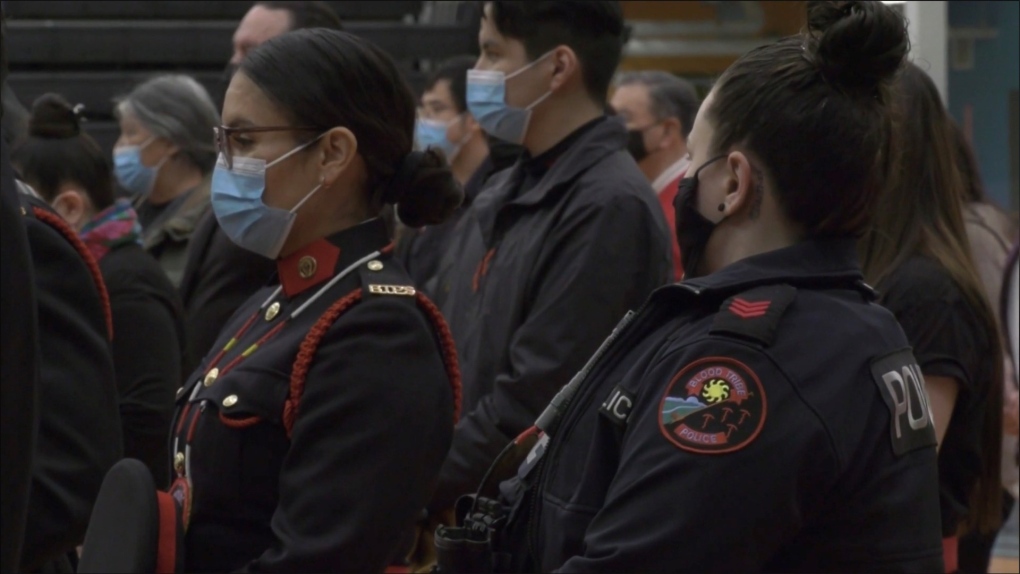'Big step forward': Lethbridge College to offer Indigenous policing microcredentials
 Through the new program, current officers, cadets and some Lethbridge College School of Justice students will have the option to take courses specific to Indigenous policing.
Through the new program, current officers, cadets and some Lethbridge College School of Justice students will have the option to take courses specific to Indigenous policing.
In an effort to increase Indigenous policing education, Lethbridge College is getting set to release a new microcredential program.
"Most cadet training in Western Canada is focused on municipal policing and ours at the college is focused on that as well," said Trudi Mason, dean of the Centre for Justice and Human Services.
"We'd like to be able to offer culturally appropriate and necessary education to our Indigenous police services.
"The Blood Tribe Police Service identified to us that there's a gap in the training for Indigenous policing and we need to be able to fill that gap somehow, so we were working with First Nation police services to do that."
The microcredentials are short-term, flexible learning programs designed for re-skilling or up-skilling those already in the industry.
"(There are) six microcredentials that we want to offer … domestic violence/elder abuse; sexual abuse/human trafficking; impaired driving; controlled drugs and substances act/drug matters; writing; and tribal policing."
In his more than 30 years of law enforcement, Blood Tribe Police Service Chief Grant Buckskin has seen changes in both communities and the police forces serving them.
"It's very exciting," Buckskin said. "I'm really excited about this and it's a big step forward."
Buckskin hopes new programming at Lethbridge College will give officers a better glimpse into Indigenous communities and understand that it’s more than just policing.
"It's like what the Blood Tribe did with the whole opioid crisis – it's get this wrap-around service," Buckskin explained.
"So, okay, we've identified the problem, we know this offence has happened, but rather than just going to court all the time and charging people, what can we do to actually help people and what services can we offer?
"Enforcement is only one aspect."
The Blood Tribe, Tsuut'ina Nation and Lakeshore police are working with the college on the new microcredential training.
Through the new program, current officers, cadets and some Lethbridge College School of Justice students will have the option to take courses specific to Indigenous policing.
Mason says despite only releasing microcredentials, there's still room to grow when it comes to Indigenous policing education.
"It's not a fair stretch to think about if we could offer an Indigenous policing cadet program," she said.
"We know that there are many tribal police services out there right now, we have many nations that are looking to have their own policing services, so how can we assist them in developing that program and develop that education that's needed for their members?"
The first microcredential is on track for an early spring delivery, while the other five will be released in the fall.
Completion of the Indigenous policing microcredential program will be recognized with digital badges issued on the Badgr platform.
CTVNews.ca Top Stories

Donald Trump says he urged Wayne Gretzky to run for prime minister in Christmas visit
U.S. president-elect Donald Trump says he told Canadian hockey legend Wayne Gretzky he should run for prime minister during a Christmas visit but adds that the athlete declined interest in politics.
Historical mysteries solved by science in 2024
This year, scientists were able to pull back the curtain on mysteries surrounding figures across history, both known and unknown, to reveal more about their unique stories.
King Charles III focuses Christmas message on healthcare workers in year marked by royal illnesses
King Charles III used his annual Christmas message Wednesday to hail the selflessness of those who have cared for him and the Princess of Wales this year, after both were diagnosed with cancer.
Mother-daughter duo pursuing university dreams at the same time
For one University of Windsor student, what is typically a chance to gain independence from her parents has become a chance to spend more time with her biggest cheerleader — her mom.
Thousands without power on Christmas as winds, rain continue in B.C. coastal areas
Thousands of people in British Columbia are without power on Christmas Day as ongoing rainfall and strong winds collapse power lines, disrupt travel and toss around holiday decorations.
Ho! Ho! HOLY that's cold! Montreal boogie boarder in Santa suit hits St. Lawrence waters
Montreal body surfer Carlos Hebert-Plante boogie boards all year round, and donned a Santa Claus suit to hit the water on Christmas Day in -14 degree Celsius weather.
Canadian activist accuses Hong Kong of meddling, but is proud of reward for arrest
A Vancouver-based activist is accusing Hong Kong authorities of meddling in Canada’s internal affairs after police in the Chinese territory issued a warrant for his arrest.
New York taxi driver hits 6 pedestrians, 3 taken to hospital, police say
A taxicab hit six pedestrians in midtown Manhattan on Wednesday, police said, with three people — including a 9-year-old boy — transported to hospitals for their injuries.
Azerbaijani airliner crashes in Kazakhstan, killing 38 with 29 survivors, officials say
An Azerbaijani airliner with 67 people onboard crashed Wednesday near the Kazakhstani city of Aktau, killing 38 people and leaving 29 survivors, a Kazakh official said.






























